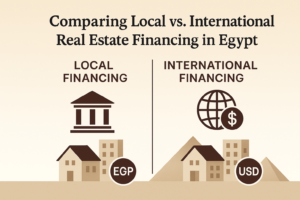Real Estate or Gold – Which is the Smarter Investment?
Investing is all about maximizing returns while minimizing risk, and two of the most popular options are real estate and gold. Both assets have long been considered safe-haven investments, but choosing between them requires careful consideration of your financial goals, risk tolerance, and market trends.
Real estate provides tangible value, rental income, and long-term appreciation, while gold is a highly liquid asset and a hedge against inflation. So, how do you decide which investment suits you best? This guide dives deep into the pros, cons, and financial impact of real estate vs. gold, helping you make an informed decision.
Understanding Real Estate Investment: A Tangible Asset with Stable Returns
Why Real Estate is a Strong Investment Option
Real estate is a physical asset that generates steady cash flow and appreciates over time. It is a preferred choice for investors looking for long-term security, passive income, and portfolio diversification.
Key Benefits of Real Estate Investment





Downsides of Real Estate Investment



Best Real Estate Investment Locations for 2025
If you decide on real estate, choosing the right location is key to success. Some of the top investment areas include:
- New Administrative Capital, Egypt – A futuristic city offering high ROI on commercial and residential properties.
- Dubai, UAE – A real estate hub with luxury developments and tax-free investment options.
- New York City, USA – High rental demand and solid appreciation rates.
- London, UK – A stable real estate market ideal for long-term investors.
Gold Investment: The Safe-Haven Asset for Financial Stability
Why Gold is a Popular Investment?
Gold has been a store of value for centuries, offering security and stability in times of economic uncertainty. Many investors turn to gold during market downturns because it tends to retain or increase in value when stock markets crash.
Key Benefits of Gold Investment




Downsides of Gold Investment



Ways to Invest in Gold
There are different ways to add gold to your investment portfolio, including:
- Physical Gold (Bars & Coins) – Traditional and tangible but requires storage.
- Gold ETFs (Exchange-Traded Funds) – Provides easy trading without physical ownership.
- Gold Mining Stocks – Investing in companies that extract gold.
- Gold Futures & Options – A speculative method for traders who understand market trends.
Real Estate vs. Gold: Key Differences
- Capital Growth:
- Real Estate: Appreciates over time with increasing demand.
- Gold: Increases based on market conditions.
- Passive Income:
- Real Estate: Generates rental income, providing consistent cash flow.
- Gold: No recurring income—value depends solely on price fluctuations.
- Liquidity:
- Real Estate: Low—selling a property takes time.
- Gold: High—can be sold instantly for cash.
- Inflation Hedge:
- Real Estate: Protects against inflation as property values increase over time.
- Gold: A strong inflation hedge, maintaining value during economic downturns.
- Initial Investment:
- Real Estate: Requires high upfront costs, including down payments and maintenance.
- Gold: Can start with small amounts, making it more accessible.
- Market Volatility:
- Real Estate: Stable in the long term, with minimal price fluctuations.
- Gold: Fluctuates in the short term, influenced by global economic trends.
- Maintenance Costs:
- Real Estate: Requires ongoing expenses such as property taxes and repairs.
- Gold: No upkeep costs, making it hassle-free.
- Risk Level:
- Real Estate: Lower risk, but depends on market conditions and location.
- Gold: Higher risk due to price fluctuations and market sentiment.
Choosing the Right Investment: Real Estate or Gold?
The choice between real estate and gold depends on your investment goals, risk tolerance, and financial situation. Here’s a quick guide to help you decide:
- Choose Real Estate If:
- You want long-term capital appreciation and passive income.
- You can afford high initial costs and are willing to wait for returns.
- You prefer tangible assets with tax benefits.
- Choose Gold If:
- You need a liquid and easily tradable asset.
- You want a safe haven investment to protect against economic downturns.
- You prefer a low-maintenance investment with no additional costs.
Pro Tip: The best investment strategy is diversification – consider allocating funds to both real estate and gold to balance risk and rewards.
Frequently Asked Questions (FAQs)
1. Is gold more profitable than real estate?
Gold can provide short-term profits due to price fluctuations, but real estate offers long-term appreciation and passive income.
2. Can gold lose its value like real estate?
Gold prices fluctuate, but it rarely loses all value, unlike real estate, which may decline due to market crashes or poor location choices.
3. What is the safest investment during economic crises?
Gold is traditionally a safe-haven asset, while real estate remains stable in well-developed markets.
4. Should I invest in real estate or gold in 2025?
It depends on your financial goals. If you want income-generating assets, choose real estate. If you seek liquidity and security, go for gold.
5. How can I invest in both gold and real estate?
You can buy rental properties while holding gold ETFs or physical gold to diversify your portfolio.
Make the Right Investment Choice with Consult
Still wondering whether to invest in real estate or gold? Consult provides expert guidance to help you:



Contact Consult today for professional investment advice and secure the best opportunities in real estate and gold

















